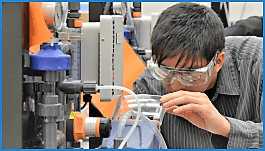Ontario First Nations communities partnering with clean water agency
September 21, 2023

AWWA Articles
Ontario First Nations communities partnering with clean water agency
Hundreds of water professionals in First Nations communities across Ontario, Canada, have taken advantage of training and resources provided through an ongoing collaboration with the Walkerton Clean Water Centre (WCWC).
 “WCWC is an operational service agency of the Government of Ontario with the mandate to safeguard drinking water for the entire province through training, education and supports,” said Brian Bates, WCWC chief executive officer. “We are also committed to ensuring that the 133 First Nations drinking water systems across Ontario have access to our training, so as to support their ability to build capacity and sustainability.”
“WCWC is an operational service agency of the Government of Ontario with the mandate to safeguard drinking water for the entire province through training, education and supports,” said Brian Bates, WCWC chief executive officer. “We are also committed to ensuring that the 133 First Nations drinking water systems across Ontario have access to our training, so as to support their ability to build capacity and sustainability.”
The agency began offering an entry-level course for drinking water system operators in First Nations systems in 2018. WCWC also provides training for First Nations Chiefs and councils, managers, and supervisors responsible for water systems on the components of effective water system management, and the resources and practical tools available to them. (Pictured right, operator in entry-level training.)
Since then, more than 200 First Nations operators have completed the entry-level course, and nearly 100 have also completed additional specialty training while working in their community. In addition, around 185 First Nations community leaders have been trained on their responsibilities in managing water systems.
“The majority of operators who completed the entry-level course are continuing to work as operators and staying in their communities,” Bates said. “Those who attended the leadership training better understand their role, what it takes to run a water system, and how to support their operators.”
Establishing trust and partnerships
 Back in 2016, WCWC began the process of developing training specific to First Nations operators by listening to what issues they were trying to resolve and what special circumstances they needed to address.
Back in 2016, WCWC began the process of developing training specific to First Nations operators by listening to what issues they were trying to resolve and what special circumstances they needed to address.
“They know best what their issues are, what they’ve tried that has worked, and what hasn’t worked,” Bates said. “From there, we figure out what we can pull together from our training catalogue to meet their needs, and if we don’t have it, we endeavor to develop it. As a result of our collaborative approach, we have very strong relationships with many of the First Nations communities.”
In fact, WCWC partnered with the Keewaytinook Okmakanak/Northern Chiefs Council and the Ontario First Nations Technical Services Corporation to develop training content. Additionally, both organizations have members who are registered trainers with WCWC and provide training in First Nations communities and elsewhere.
“These trainers are uniquely suited to deliver training, drawing upon their lived experiences as operators in First Nations communities providing the context that participants can relate to, so they draw more meaning from a course,” Bates said.
In addition to its three full-time trainers, WCWC has a network of 35 contract trainers located throughout Ontario who have years of experience in expertise in a variety of technical topics.
Providing comprehensive support
 Another of WCWC’s offerings is its pilot testing program, which helps small and remote communities across Ontario test small-scale versions of various drinking water treatment processes. This can help system owners who are experiencing operational problems meet drinking water standards by trying out a solution recommended by a consultant. (Pictured right, First Nations leaders during water system training.)
Another of WCWC’s offerings is its pilot testing program, which helps small and remote communities across Ontario test small-scale versions of various drinking water treatment processes. This can help system owners who are experiencing operational problems meet drinking water standards by trying out a solution recommended by a consultant. (Pictured right, First Nations leaders during water system training.)
“We help water system owners, including those in First Nations communities, by working alongside their consulting engineers to pilot and evaluate treatment processes, while training the operators on these processes at the same time,” Bates said. “This helps them feel very comfortable with the technology before they buy it.”
WCWC also staffs a 1-800 helpline during business hours and maintains an online library of drinking water resources at DrinkingWaterResourceLibrary.ca. “It’s a forever-growing library based on the issues we’re seeing,” Bates said.
As a member of the American Water Works Association and the Ontario Water Works Association, WCWC finds the conferences invaluable to reconnect with its training participants. The agency keeps up with best practices through Journal AWWA and other resources and serves on OWWA committees focused on operator education and training.
“It’s a mutually beneficial relationship for sure,” Bates said.
Advertisement